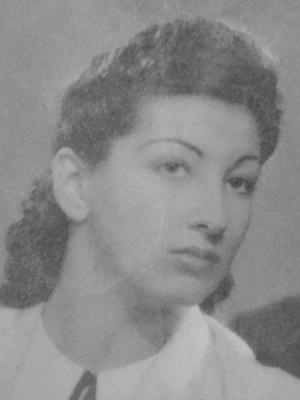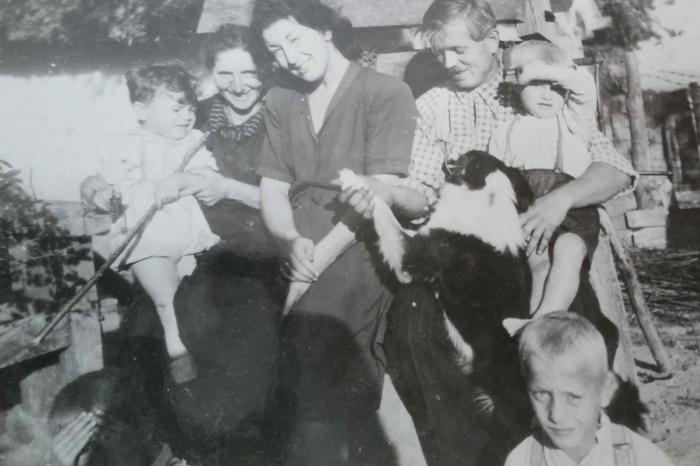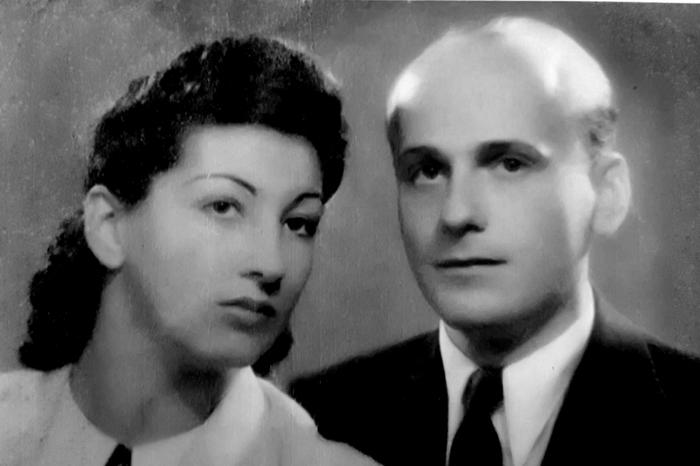Ilona Flaschner

Born: Miskolc, Hungary, 1919
Wartime experience: hiding and passing/false identity
Writing Partner: Judith Levine
Ilona Flaschner was born in Miskolc, Hungary, in 1919. The oldest of seven siblings, Ilona lived with her grandmother in Czechoslovakia before returning to Hungary at the age of nine to help take care of her siblings.
At sixteen, she moved to Budapest to live with her aunt, where she met her husband, Alex Flaschner, whom she married at seventeen years old. Starting in 1940, her husband spent the war years in the Hungarian forced labour service, returning home occasionally. Their son, Ivan, was born in 1942. Ilona survived the Nazi invasion of Hungary and deportations of Hungarian Jews by first hiding with her son in Bokod, a small village, where she received a friend’s identity papers. She then returned to Budapest and worked as a cleaner in a hospital, passing as non-Jewish, until the city was liberated by the Soviets. Ilona reunited with her husband after the war. They lived in Hungary until the revolution in 1956, when they left for Vienna and, as refugees, were soon accepted into England. Ilona, Alex and their son, Ivan, stayed in England for six months and then immigrated to Canada in 1957, settling in Toronto, where Ilona still lives.
Return to Budapest
It was now late fall of 1944. I was so miserable — I was desperate to see my son. I didn’t care about the danger. I thought that if I had to die, I would die with my child. I travelled to Bokod, the small village outside Budapest where Ivan was hidden with our former maid, Vida. It was a terrible journey by train. There were many stops, and we had to change trains. I arrived early in the morning and found the house empty except for Ivan. I became very ill soon after arriving in Bokod, and Vida and her family hid me for a week. After I was feeling somewhat better, they told me I had to leave, otherwise they too would be in danger. Vida’s mother gave me her identification papers, and I changed my clothes and returned to Budapest; I again left Ivan behind with Vida and her family, since he was safe there, even though I couldn’t stay. They had told people he was the son of a relative from the Netherlands.
A German truck picked me up on my way back to Budapest. There were two German soldiers and another man in the truck. I spoke German, but I could not let them know that I spoke the language. They asked me where I was going, and I replied “Budapest.” They dropped me in the city and gave me sugar and cookies and other items. Then one of the German soldiers told me he was from Cologne, Germany. He said that he was a very good German, that he did not agree with Hitler and that he knew who I was (a Jew). He said, “God bless you” and let me go.
I didn’t know where to go and was walking on the main street. I thought I would go to the ghetto in Budapest, where all the other Jews had been sent. Suddenly, I heard a siren, and everyone on the street was told to quickly go to the underground shelter. I didn’t want to go because I hadn’t had a chance to fully read the identification papers I had been given and wouldn’t be able to say who I was supposed to be in a convincing way. I continued walking and someone stopped me and asked me where I was going. I didn’t know what to say, and this person said, “Are you going to the hospital?” So I said yes, the hospital was where I was headed.
I arrived at the hospital and waited until late afternoon, sitting in the hallway. Everyone else had left. The doorman came to me and told me that I could not stay there, visiting hours were over. I told him that I was from Bokod and that I was supposed to meet someone here who knew how I could find my boyfriend, but that I did not know how to find the person. I told him I had nowhere to go. The doorman took me downstairs to an office and told a woman that I was looking for work. They took anybody, since there were so few people who could work and it was a big hospital. The woman asked me my name. I gave her the name on my false identification papers. She said that there was a woman working in the hospital named Elizabeth with the same last name as mine and also from the same village, Bokod. I had no idea who this woman could be. We eventually found her asleep in another part of the hospital. She was a nun. They left me with her, and she confirmed who she was and that she was from Bokod. When the others had left us, I told her that I was not who my identification papers described. I asked her to help me. She took me to an office downstairs, and the hospital administrators officially gave me a job as a cleaner. I worked there under my false identity until the Soviets liberated us.
Dr. Fekete was the head doctor there and was very friendly toward Jews. There were many Jews hiding in the hospital, either as patients or as workers. He saved many Jews. In one of the wards, there was a patient who had syphilis. He had apparently killed many Jews. There were guards with him. The guards would go out at night and when they returned they would make notches on their guns showing how many Jews they had killed that night. I was afraid these guards would discover me and learn I was Jewish. When the guards went out looking for Jews, many of us hid in the hospital, but the guards would find Jews anyway, and we would hear about them being shot in the hospital courtyard.

Ilona (third from the left), visiting her son, Ivan (far left), on the farm where he was in hiding with the family pictured here. Bokod, Hungary, circa summer 1944.

Ilona and her husband, Alex (Sandor), on their wedding day. Budapest, Hungary, September 10, 1940.
We tried to live; I tried to find a job, but everything was in ruins; there was no food, nothing.
Soviet Liberation of Budapest
I told the Soviet soldiers I was Jewish, and one of them said, “Me too.” He asked me how I had managed to survive, and I told him my story, how I had worked in the hospital. I told them about the patient with syphilis. He said that patient had tried to escape but the Soviets had caught him and shot him. However, in June 1945 Ireceived a summons to go to court. A Hungarian communist official asked me how I had managed to survive, and I again related my story. He asked me if I would be able to recognize the patient with syphilis. A door opened behind me, and there he was, in handcuffs and leg cuffs. I yelled out his name. He was executed the same day — we watched. I asked how this had happened – I thought he had been shot by Soviet soldiers six months earlier. Apparently, he had changed his uniform and escaped to Salzburg, Austria, with forged papers, where he was caught and then sent back to Hungary. Ironically, the forged papers identified him as another wanted criminal! After arriving back in Hungary, he confessed his true identity.
I heard from a man in the underground that my husband, Alex, had been killed after the forced labour camp in Bor had been liquidated. I was told he and the other workers had had to dig their own graves. Thousands of workers had to march from the copper mines in Serbia to Nazi concentration camps, and many of them were murdered along the way. The man who told me all this had survived the march.
After liberation I tried to find my home. I was lucky — I found my apartment in Budapest intact. On May 1, I took a train to Bokod to get my son and bring him back to Budapest. I was thankful to those who had kept him safe. We tried to live; I tried to find a job, but everything was in ruins; there was no food, nothing.
One day, my friend Eva and I were walking in the street. I heard my name called. A man named Imre, who was Alex’s cousin, came over to me and told me that Alex was alive. I couldn’t believe it. I told him that I had spoken to someone who had seen him being shot. I asked him why he was here now and Alex was not. He told me that he had been in Buchenwald concentration camp with Alex when the camp was liberated. He had been just sitting by a gate under observation outside Buchenwald after liberation, waiting, when a car stopped and the driver asked if anyone wanted to go to Prague. Imre said he and a few others had jumped up to go and after eight days of travelling they had all arrived in Budapest. He had not had a chance to tell Alex that he was leaving.
I eventually found a job, but was finding it very difficult to take care of Ivan on my own while also working. I even considered taking Ivan back to Bokod, because there was no one to take care of him in Budapest. I needed to work and was trying to build a home for when Alex returned. But I didn’t get a chance. One very hot day in August, all the doors and windows wide open due to the heat, my friend Eva’s father came to my place and started shouting, “Ilona, get up, get up!” I asked him why he was making so much noise. Ivan was falling asleep, and I was planning to take him to the train back to Bokod later that day. And suddenly there was Alex. When I saw him, I fainted. I was in shock, but my son, not even three years old yet, was sitting up saying, “That’s my daddy.” He recognized his father from a picture we had in the apartment!

